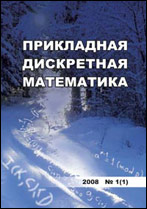|
This article is cited in 9 scientific papers (total in 9 papers)
Theoretical Backgrounds of Applied Discrete Mathematics
Binary solutions to large systems of linear equations
A. V. Seliverstov
Institute for Information Transmission Problems of the Russian Academy of Sciences
(Kharkevich Institute), Moscow, Russia
Abstract:
The concept of generic computational complexity has been extended to generalized register machines over an ordered field. In this case, the machine halts at every input and gives a meaningful answer at almost every input, but it can abandon the calculation using explicit notification, that is, there exists the vague halting state. Note that the machine does not make any error. A generic polynomial time algorithm is proposed to recognize systems of linear equations without any binary solution, when the number of equations $m$ is close to the number of unknowns $n$. More precisely, two conditions are required. Firstly, the inequality $2n\geqslant (n-m+1)(n-m+2)$ holds. Such systems are called large because the number of equations is close to the number of unknowns. Secondly, some assumptions of generality of the system of equations are fulfilled. Our approach is based on finding a positive definite quadratic form among the set of forms that depend on parameters. On the other hand, a counterexample has been found, whicht shows the inapplicability of this method for checking the absence of any binary solution to one equation.
Keywords:
binary solution, linear equation, generalized register machine, computational complexity.
Citation:
A. V. Seliverstov, “Binary solutions to large systems of linear equations”, Prikl. Diskr. Mat., 2021, no. 52, 5–15
Linking options:
https://www.mathnet.ru/eng/pdm735 https://www.mathnet.ru/eng/pdm/y2021/i2/p5
|

| Statistics & downloads: |
| Abstract page: | 271 | | Full-text PDF : | 96 | | References: | 47 |
|




 Contact us:
Contact us: Terms of Use
Terms of Use
 Registration to the website
Registration to the website Logotypes
Logotypes








 Citation in format
Citation in format 
